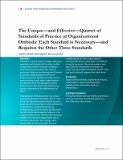The Unique—and Effective—Quartet of Standards of Practice of Organizational Ombuds: Each Standard is Necessary—and Requires the Other Three Standards
Author(s)
Rowe, Mary; MacAllister, Bruce
DownloadJournal Article (2.164Mb)
Metadata
Show full item recordAbstract
Employers in many sectors consider adding an organizational Ombuds (OO) to their conflict management system. However, employers often have questions about this unusual profession. How are the International Ombuds
Association (IOA) Standards of Practice different from the standards of other human services professionals within organizations—and different from the standards of other Ombudsmen? How do the IOA Standards of Practice contribute to the effectiveness of OOs? Organizational Ombuds practice to a unique quartet of Standards of Practice. One or more of the IOA Standards will be familiar to many, based on some similarities in other professions:
Independence, Impartiality/Neutrality, Confidentiality, and Informality. But the set of four standards taken together appears to be unique to OO practice. The four IOA Standards enable OOs to serve an organization and its
members effectively—by creating a zero-barrier office (a safe, accessible, fair and credible place) for every organizational constituent to discuss good ideas and difficult or painful concerns. This article explains why
each of the four Standards is necessary to create the organizational Ombuds model—and how each Standard supports the other three.
Date issued
2025-05Publisher
Journal of the International Ombuds Association
Citation
Mary Rowe and Bruce MacAllister, "The Unique—and Effective—Quartet of Standards of Practice of Organizational Ombuds: Each Standard is Necessary—and Requires the Other Three Standards," Journal of the International Ombuds Association Vol. 18, Issue 1 (2025): 45-54.
Keywords
organizational ombuds, IOA Standards of Practice, independence, impartiality, neutrality, confidentiality, informality, ombuds effectiveness